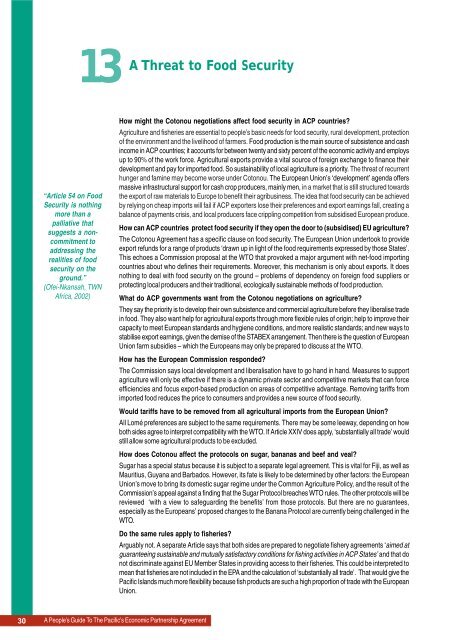REPA Booklet - Stop Epa
REPA Booklet - Stop Epa
REPA Booklet - Stop Epa
You also want an ePaper? Increase the reach of your titles
YUMPU automatically turns print PDFs into web optimized ePapers that Google loves.
13<br />
A Threat to Food Security<br />
“Article 54 on Food<br />
Security is nothing<br />
more than a<br />
palliative that<br />
suggests a noncommitment<br />
to<br />
addressing the<br />
realities of food<br />
security on the<br />
ground.”<br />
(Ofei-Nkansah, TWN<br />
Africa, 2002)<br />
How might the Cotonou negotiations affect food security in ACP countries?<br />
Agriculture and fisheries are essential to people’s basic needs for food security, rural development, protection<br />
of the environment and the livelihood of farmers. Food production is the main source of subsistence and cash<br />
income in ACP countries; it accounts for between twenty and sixty percent of the economic activity and employs<br />
up to 90% of the work force. Agricultural exports provide a vital source of foreign exchange to finance their<br />
development and pay for imported food. So sustainability of local agriculture is a priority. The threat of recurrent<br />
hunger and famine may become worse under Cotonou. The European Union’s ‘development’ agenda offers<br />
massive infrastructural support for cash crop producers, mainly men, in a market that is still structured towards<br />
the export of raw materials to Europe to benefit their agribusiness. The idea that food security can be achieved<br />
by relying on cheap imports will fail if ACP exporters lose their preferences and export earnings fall, creating a<br />
balance of payments crisis, and local producers face crippling competition from subsidised European produce.<br />
How can ACP countries protect food security if they open the door to (subsidised) EU agriculture?<br />
The Cotonou Agreement has a specific clause on food security. The European Union undertook to provide<br />
export refunds for a range of products ‘drawn up in light of the food requirements expressed by those States’.<br />
This echoes a Commission proposal at the WTO that provoked a major argument with net-food importing<br />
countries about who defines their requirements. Moreover, this mechanism is only about exports. It does<br />
nothing to deal with food security on the ground – problems of dependency on foreign food suppliers or<br />
protecting local producers and their traditional, ecologically sustainable methods of food production.<br />
What do ACP governments want from the Cotonou negotiations on agriculture?<br />
They say the priority is to develop their own subsistence and commercial agriculture before they liberalise trade<br />
in food. They also want help for agricultural exports through more flexible rules of origin; help to improve their<br />
capacity to meet European standards and hygiene conditions, and more realistic standards; and new ways to<br />
stabilise export earnings, given the demise of the STABEX arrangement. Then there is the question of European<br />
Union farm subsidies – which the Europeans may only be prepared to discuss at the WTO.<br />
How has the European Commission responded?<br />
The Commission says local development and liberalisation have to go hand in hand. Measures to support<br />
agriculture will only be effective if there is a dynamic private sector and competitive markets that can force<br />
efficiencies and focus export-based production on areas of competitive advantage. Removing tariffs from<br />
imported food reduces the price to consumers and provides a new source of food security.<br />
Would tariffs have to be removed from all agricultural imports from the European Union?<br />
All Lomé preferences are subject to the same requirements. There may be some leeway, depending on how<br />
both sides agree to interpret compatibility with the WTO. If Article XXIV does apply, ‘substantially all trade’ would<br />
still allow some agricultural products to be excluded.<br />
How does Cotonou affect the protocols on sugar, bananas and beef and veal?<br />
Sugar has a special status because it is subject to a separate legal agreement. This is vital for Fiji, as well as<br />
Mauritius, Guyana and Barbados. However, its fate is likely to be determined by other factors: the European<br />
Union’s move to bring its domestic sugar regime under the Common Agriculture Policy, and the result of the<br />
Commission’s appeal against a finding that the Sugar Protocol breaches WTO rules. The other protocols will be<br />
reviewed ‘with a view to safeguarding the benefits’ from those protocols. But there are no guarantees,<br />
especially as the Europeans’ proposed changes to the Banana Protocol are currently being challenged in the<br />
WTO.<br />
Do the same rules apply to fisheries?<br />
Arguably not. A separate Article says that both sides are prepared to negotiate fishery agreements ‘aimed at<br />
guaranteeing sustainable and mutually satisfactory conditions for fishing activities in ACP States’ and that do<br />
not discriminate against EU Member States in providing access to their fisheries. This could be interpreted to<br />
mean that fisheries are not included in the EPA and the calculation of ‘substantially all trade’. That would give the<br />
Pacific Islands much more flexibility because fish products are such a high proportion of trade with the European<br />
Union.<br />
30<br />
A People’s Guide To The Pacific’s Economic Partnership Agreement
















